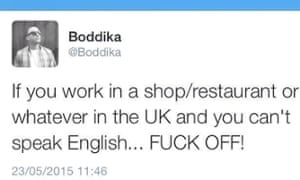
After Lithuanian dance producer Ten Walls compared gay men to Irish paedophile priests in a sickening Facebook post last weekend, the dance community mobilised against him almost instantly. Five European festivals and his booking agency dropped him, artists from the Chemical Brothers to Tiga to Optimo all condemned him, and London’s Phonica record store boycotted his new release to the point where it refunded people who’d preordered them.
The speed and breadth of this reaction is testament to a culture which was built by outsiders; homophobia will always flail for oxygen in the club. The disco bacchanals of Fire Island, the hyperemotional house of Chicago, the voracious sexuality of Berghain – dance culture is built on gay culture, and the underground, full of nerds who drink in its rich heritage as well as look forward, is unlikely to ever forget the importance of those roots.
But nevertheless, spots of bigotry still occasionally stain the dancefloor. On Monday, a review of Field Day by PC Music’s GFOTY was published by Noisey, in which she referred to Malian kora legends Toumani and Sidiki Diabaté as “Bombay Bicycle Club blacked up” a witless line that aimed for snarky zing but fell into an unfunny void of racism. (She has since apologised, claiming she “was trying to make a joke about appropriation, but I fucked up”.) GFOTY’s shtick is to be so shallow she almost evaporates, and you could make a reasonable stab at claiming it was all part of PC Music’s aesthetic: hipster and J-pop banality satirically dialled up to extreme proportions. Yet without the music as context, she is just an idiot. For many, this will be the moment when they stumble Dorothy-like behind the curtain to find that PC Music is a barely nourished concept.

Then there was Boddika – a major producer working in the porous space around UK bass and techno – who tweeted earlier this month: “If you work in a shop/restaurant or whatever in the UK and you can’t speak English … FUCK OFF!” He later excused it as “sheer frustration”,(there were plenty of DJs who defended him, from Zed Bias to Eats Everything). Grime DJ Elijah noted the irony of the fact that the label Swamp81, which Boddika has worked with, is named after a police operation during the 1981 Brixton riots – suddenly Swamp81’s name, situating itself in Brixton’s Afro-Caribbean bass culture, was cast in an awkward light.
But the most mendacious and widespread bigotry in clubbing remains sexism. Maceo Plex’s patronising reaction in 2013 to producer and DJ Nina Kraviz gettinginterviewed in a bubble bath are backed up by the countless keyboard warriors who regularly feel threatened by an attractive woman making techno. Holly Herndon, in a Guardian interview, drolly noted: “When I first started releasing music I was only compared to women I sounded nothing at all like. Then I graduated to being compared to male geniuses I’ve supposedly been influenced by.” The verymalelineups Tumblr charts just how dominant men still are in the supposedly emancipated arena of the dance underground. Even at credible techno events, Ibizan clubs are full of women dancing in cages, and the visual language of mainstream dance is based around ogling bikini shots. Sexual harassment is still an epidemic on dancefloors.
These artists’ comments, and this ongoing inequality, are a reminder that clubs are not yet the utopia that the culture aspires towards. And while the lyrics of house and rave tracks often encourage universal understanding, perhaps this isn’t realistic. As Berlin-via-Houston producer Lotic’s response to GFOTY/Ten Walls shows, for many people clubs are a space to hide and protect oneself from the very hate they encounter in everyday life.

No comments:
Post a Comment